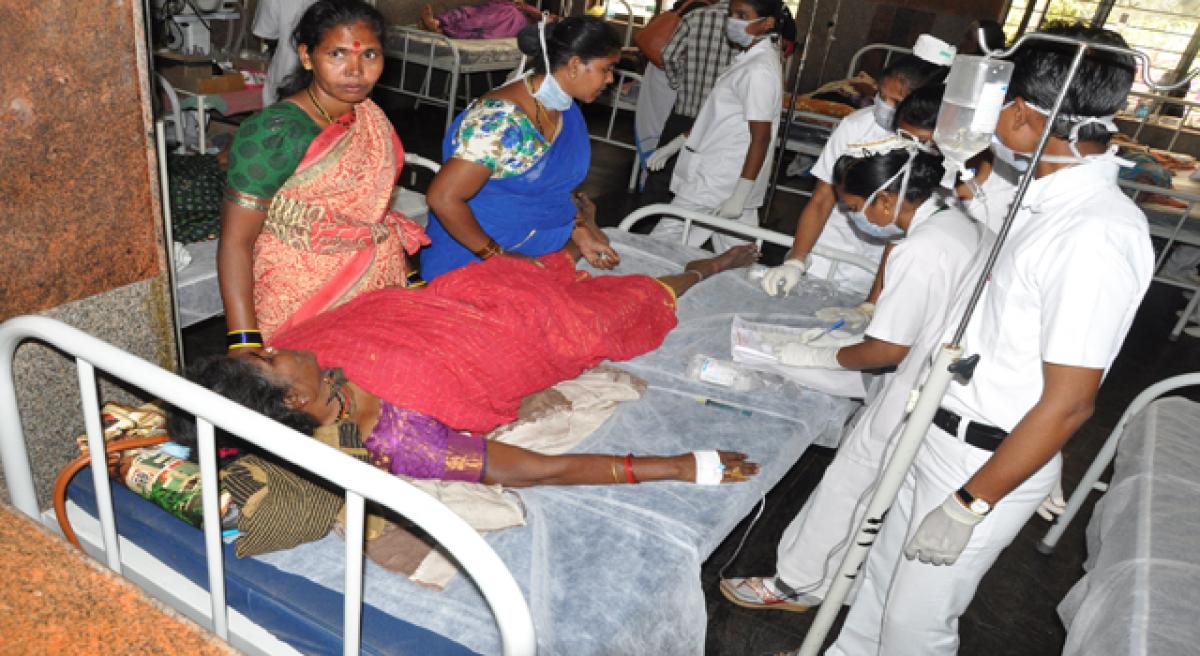Live
- Govt plans to establish offshore Johns Hopkins University Campus in India
- Goa Aces clinch Indian Racing League title
- Study finds how hormone therapy can reshape the skeleton
- High-street fashion players looking at India for manufacturing: Report
- Shreyas Iyer to lead Mumbai as Prithvi Shaw returns for Syed Mushtaq Ali Trophy
- 'Failed to resolve crisis': NPP withdraws support from BJP govt in Manipur
- Chennai: Actress Kasturi Remanded in Custody Until 29th of This Month
- Aaqib Javed likely to become Pakistan's new white-ball head coach
- BJP panel to draft poll charge sheet against AAP govt in Delhi
- Allu Arjun Thanks Fans in Patna, Teases 'Pushpa 2' Release
Just In

Poor maintenance of drinking water tanks and overhead tanks is the prime reason for water contamination in the state. Though people are suffering from diarrhoea and seasonal fevers due to water contamination, the officials of the departments of municipal, rural water scheme (RWS), panchayat raj and health remain as mute spectators.
Vijayawada: Poor maintenance of drinking water tanks and overhead tanks is the prime reason for water contamination in the state. Though people are suffering from diarrhoea and seasonal fevers due to water contamination, the officials of the departments of municipal, rural water scheme (RWS), panchayat raj and health remain as mute spectators. There has been a widespread debate on the importance of cleanliness and maintenance of water tanks, after diarrhoea deaths in Guntur city.
Significantly, the MLAs of ruling Telugu Desam party raised the topic in the Assembly two days ago and they also expressed displeasure over poor maintenance of tanks. As many as 17,000 overhead tanks and 40,000 drinking water tanks are in the villages. The government has plans to construct 10,000 more tanks in the next year. The chlorination should be maintained according to the norms of health department. As the chlorination is not being done properly, the MLAs brought the issue to the notice of the government.
The medical and health department framed several guidelines for water purification. The panchayat raj and medical and health department have provided funds for water purification. As per the recommendations of the 13th Finance Commission, an amount of Rs 650 was allotted for each hand pump while Rs 80 per head for all the villages under the RWS scheme.
According to officials, the village which has an average 10,000-population should spend Rs 10 lakh for chlorination and purification works every year. Moreover, the health department should release Rs 10,000 for each village. As per health department norms, the chlorination should be done every day and the water should contain chlorine at the rate of 0.22 Parts Per Million (PPM), said one senior official of medical and health department. He said the gram panchayat staff should undertake chlorination under the supervision of medical and health department.
The whole process is being neglected completely. Moreover, overhead tanks should be cleaned weekly once, says RWS former official Padmanabha Rao. He said that chlorination date should be displayed on boards at the tanks. But the process has been completely avoided by the staff at grass-root level. One official on condition of anonymity said that the funds are being misused for the past several decades.
Water contamination in the city and towns is the result of decaying pipelines, poor maintenance and leakages in the pipes, along with lapses in chlorination. Minister for panchayat raj Nara Lokesh said the government has introduced a device for chlorination of water. In his statement in the Assembly, he said the project has been introduced in Krishna and Guntur districts as a pilot project. It would be extended to all the districts in the state, he said.

© 2024 Hyderabad Media House Limited/The Hans India. All rights reserved. Powered by hocalwire.com







